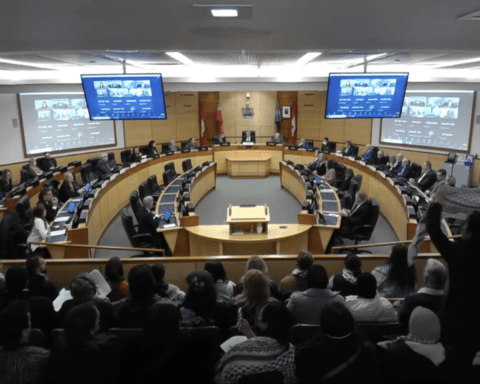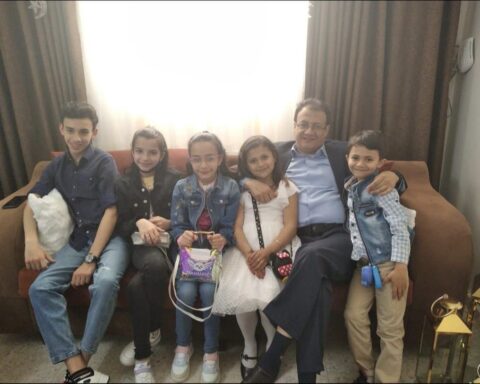Swiss-born Muslim academic and author Tariq Ramadan told an Ottawa audience that governments and the public should recognize the equal dignity of all human beings, regardless of whether they are citizens of Paris, Beirut, or any other place.
At a public lecture on November 22, Ramadan said the principle behind “Je suis Paris” should be applied with equal consistency to all victims of terror attacks. The recent attacks in Beirut, Mali and other places outside the Western world got nowhere near the same level of attention and expressions of sympathy that the November 13 shootings and bombings in Paris generated, he added.
Ramadan was the featured speaker at an event organized by the Montreal-based Canadians for Justice and Peace in the Middle East (CJPME), a non-governmental organization that advocates for justice and human rights in the storm centre of many of the world’s conflicts.
Not religion, but perception
Invited to speak about refugees, wars and the fears and fanaticism of our age, Ramadan spent much of his hour-long address deconstructing the roots of the problem, which he firmly denied was a “clash of civilizations” or religions.
“It is a matter of the geo-strategic and economic interests of the governments and transnational corporations involved in this,” he said, adding that it was a “clash of perceptions” rather than of religions.
“Where there is no justice, there is no peace.”
He commented that religion is used by Middle Eastern leaders as an instrument to manipulate Muslims, while their Western counterparts use “values” such as “democracy,” “human rights” and the “liberation of women” for the same purpose to secure the support of a secular public.
Ramadan said this has resulted in the current destabilization of the Middle East, with lethal consequences for the entire world – such as terror attacks, the curtailment of civil liberties in the name of security and the deaths of thousands of refugees as they try to flee across borders.
Ramadan emphasized that the blame for the “mess,” as he described it, must be shared equally by Western governments for their aggressive, militaristic foreign policies, and by their allies, the corrupt regimes of many Middle Eastern countries whose economic interests are aligned with those of the West.
“Where there is no justice, there is no peace,” he said, pointing out that the American government’s unconditional support of Israel has ignored the rights of Palestinians, and this has incensed Muslims everywhere, causing some of them to become radicalized.
“We (Muslims) too have a responsibility in this clash of perceptions and need to be self-critical.”
Violating the dignity of Palestinans is not often covered in the media, he said, adding that the protection of Israel has resulted in so much conflict that it has had consequences for ordinary American and French citizens.
For example, the Patriot Act in the U.S. has diminished the civil liberties of Americans, and the French government is doing the same thing in the name of security.
“Thanks, Canada, for not choosing the worst of these measures,” he said, and complimented Prime Minister Justin Trudeau for accepting 25,000 Syrian refugees. “About 2,800 migrants died in the Mediterranean within three years, but we didn’t react until we saw a photo of Aylan Kurdi,” he said, referring to the image of the three-year-old Kurdish refugee boy, who drowned last September.
Cautioning people against “indulging in emotional politics,” he advised Muslims living in the Western world to speak up against violations of human dignity everywhere. “Don’t indulge in victimhood,” he warned.
“We (Muslims) too have a responsibility in this clash of perceptions and need to be self-critical,” he stated, adding there is no unity within the Muslim diaspora, and no space for intellectual discussion.
He noted that Muslims from various countries tend to isolate themselves from one another, even if they live in the Western world.
“We need unity, not uniformity, so don’t import your divisions from your home countries,” he said.
“Because of recent events in Paris, I feel that people are not so welcoming of refugees as in the past.”
Canadians’ fears and concerns
Asked for her reaction to Ramadan’s speech and if she had any of her own fears and concerns about the fallout from the Middle Eastern conflict, Patricia Jean, office manager of CJPME and a relatively recent convert to Islam, said: “As a veiled Canadian, I am concerned about the reactions of other Canadians to Muslims. Because of recent events in Paris, I feel that people are not so welcoming of refugees as in the past.”
Kamiliya Akkouche, a student of International Development and Globalization at the University of Ottawa, said: “I agree that people should not react in an emotional way, and should address their fears by holding to account all the governments in the West and in the Middle East that are responsible.”
Kenya-born Sarah Onyango, a resident of Gatineau and host of the radio program Afrika Revisited, commented: “Kenya has received the world’s refugees, and my concern is not that refugees are coming to Canada but that we don’t have the resources to support their integration, and their communities will become breeding grounds of frustration and alienation. This will result in some of them becoming radicalized.”
Vicky Smallman, a community activist, stated that she would not want to see political parties and campaigns exploit the racism that lies under the surface. “I don’t want to see any group targeted,” she said.
Ottawa-based writer/journalist, editor, blogger, communications professional seeking freelance opportunities in political and travel writing.





